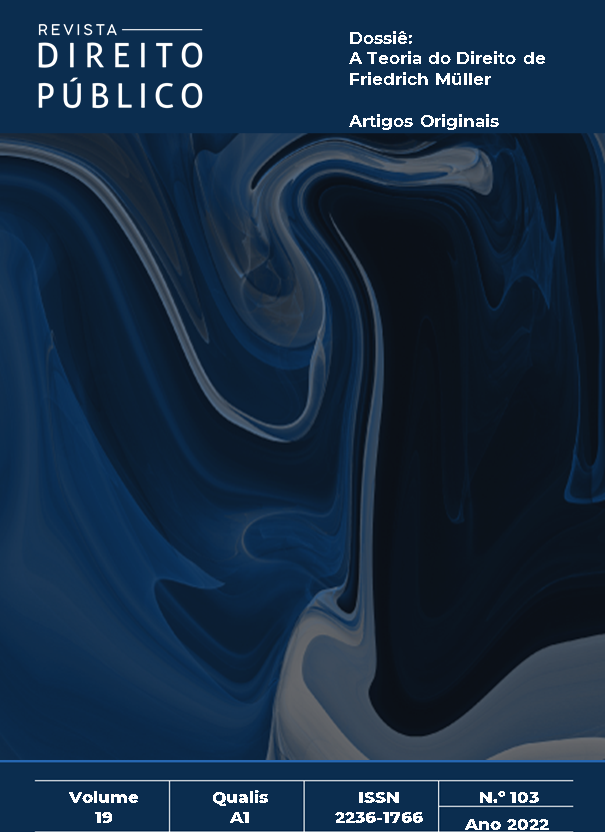RATIONALIZATION THROUGH COMMUNICATION
THE LEGAL NORM’S MEANING FROM THE POINT OF VIEW OF THE FRIEDRICH MÜLLER'S STRUCTURING THEORY OF LAW AND ITS CONNECTION WITH THE RHETORICAL WAY OF UNDERSTANDING THE LEGAL PHENOMENON
DOI:
https://doi.org/10.11117/rdp.v19i103.6588Abstract
The discussion about the phenomenon of judicialization of public policies in Brazil, which has as a backdrop the idea of normativity and effectiveness of social constitutional rights, such as the right to health, even at the expense of the budget and fiscal control parameters instituted by the system itself, has instigated questions about the conformation of meaning of the legal norm by the judicial system. Thus, with the intention of obtaining a realistic perception of the process of conformation of meaning of the legal norm and seeking to depart from the conceptions that see in social constitutional rights the ability to transport rational essences, this article, through an analytical perspective of law, aims to promote a critical and reflective study of the theoretical conceptions that endeavored to explain the process of constitution of the legal phenomenon and to share the philosophical and critical point of view of the rhetoric and of the Structuring Theory of Law formulated by Friedrich Müller. This is because the parameters offered by the idealist tradition of law, in any of its aspects, proved to be insufficient to explain how the conformation of meaning of legal discourses actually takes place. Partaking in the point of view of the rhetoric and of the Structuring Method, we understand that the law is rationalized through communication. We affirm, therefore, that, even though it is neither ontological nor essentialist, Friedrich Müller's structuring method is also not rhetorical, but shares several points of contact with this ancient way of understanding the legal phenomenon — in particular, the perception of the indissoluble connection between law and language.
Downloads
Published
How to Cite
Issue
Section
License
Copyright (c) 2022 Direito Público

This work is licensed under a Creative Commons Attribution-NonCommercial 4.0 International License.
O(s)/A(s) autores(as) dos manuscritos submetidos concorda(m) com as regras a seguir:
1) Todos os autores e autoras participaram do trabalho, são responsáveis pelas ideias e conceitos nele emitidos e atestam sua conformidade com os princípios éticos exigidos.
2) Todos os autores e autoras concordam com a forma final do trabalho e em ceder os direitos para publicação nos canais de publicação da Escola de Direito do IDP.
3) Todos os autores e autoras informam que o manuscrito é de sua autoria e assumem a responsabilidade pelo trabalho, declarando que a obra a ser publicada não infringe quaisquer direitos de propriedade intelectual de terceiros.
3.1) Em caso de submissão simultânea, além da reprovação imediata do artigo e comunicação ao(s) respectivo(s) periódico(s), a Revista Direito Público se reserva o direito de não receber novas submissões de todos os autores implicados pelo prazo de 2 (dois) anos, contado a partir da data de ciência do fato.
4) Todos os autores e autoras autoriza(m) a edição de seu trabalho e cede(m) à Escola de Direito do IDP os direitos de autor para reproduzir, editar e publicar ou veicular o citado trabalho em qualquer forma midiática, resguardada a autoria, em particular sob forma digital, em arquivo eletrônico online na Internet, bem como armazená-los em seu repositório de acordo com o desenvolvimento do processo editorial. Esta concessão não terá caráter oneroso para a Escola de Direito do IDP, não havendo remuneração sob qualquer modalidade pela utilização do referido material, tendo este o caráter de colaboração científica.












